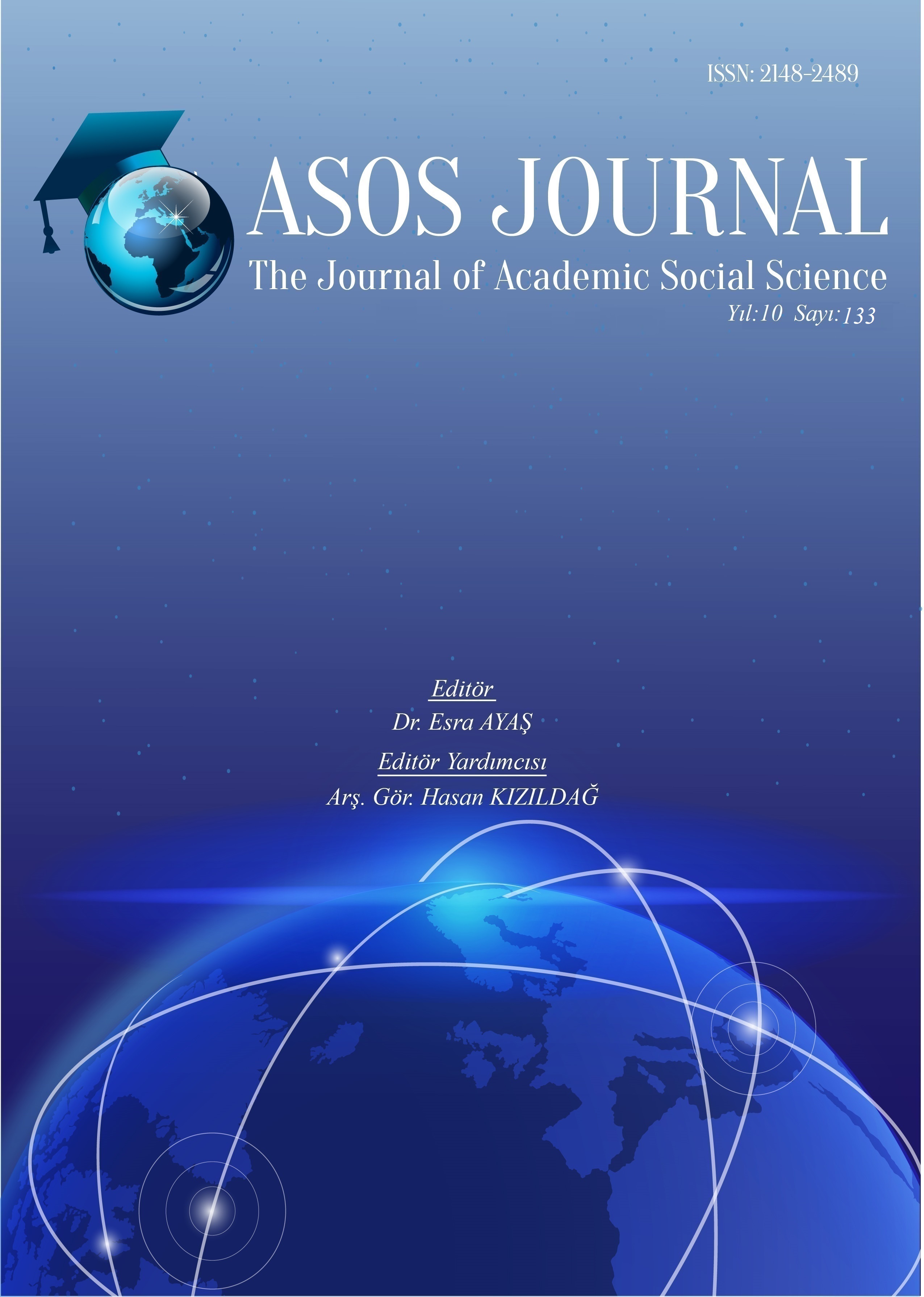1975-1978 DÖNEMINDE TÜRKIYE'YE UYGULANAN EKONOMIK YAPTIRIMLARIN ETKISI VE SAVUNMA SANAYIININ GELIŞIM AŞAMALARI
Author :
Abstract
Savunma sanayi sektörü, Türkiye Cumhuriyeti'nde özellikle son yıllarda en önemli ve en hızlı büyüyen ekonomik sektörlerden biridir. Sadece ordu ve personel ile sınırlı kalmayıp, Türkiye Cumhuriyeti diğer ülkelere de birçok savunma sistemi ve askeri teçhizat ihraç etmektedir. Türkiye Cumhuriyeti şimdi canlı bir savunma sanayisine sahipken, bundan neredeyse 45 yıl önceki (Kıbrıs'taki askeri harekatı öncesi) gibi değildi. Kıbrıs Cumhuriyeti'ndeki iç çatışmanın tırmanması nedeniyle Türkiye, adadaki binlerce Kıbrıslı Türk'ü korumak için 20-7-1974'te askeri güçlerini gönderdi. ABD, Türkiye'nin harekâtına karşı çıktı ve 1975'te Türkiye'ye üç yıl süren ekonomik yaptırımlar ve silah ambargosu uyguladı. Bu makale, tarihsel bir yaklaşımla, ABD silah ambargosunun temsil ettiği ekonomik yaptırımların Türkiye'nin savunma kapasitesi üzerindeki etkilerini değerlendirmeye ve ambargonun Türk savunma sanayisinin gelişimini nasıl etkilediğini incelemeye çalışmaktadır. Ambargonun Türk ekonomisi ve savunma kapasitesi üzerinde ciddi bir etkisi oldu çünkü Kıbrıs'taki askeri operasyon askeri ve lojistik desteğe ihtiyaç duyuyordu ve Türkiye o dönemde askeri ikmallerinin çoğu için ABD'ye bağımlıydı. Ekonomik yaptırımların ve silah ambargosunun etkilerini hisseden Türkiye, kendi savunma sanayisini geliştirmek için bugüne kadar devam eden bir program başlattı. Makale, ambargonun o dönemde sorunlara yol açsa da, nihayetinde Türkiye'nin güçlü savunma sanayileri yaratmasına ve bu alanda diğer ülkelere daha az bağımlı hale gelmesine yardımcı olduğu sonucuna varmaktadır.
Keywords
Abstract
The defense industry sector is one of the most important and fastest growing economic sectors in the Republic of Turkey, especially in recent years. It is not only limited to the army and personnel, but the Republic of Turkey is also exporting many defense systems and military equipment to other countries. While the Turkish Republic now has a vibrant defense industry, it was not like it was now almost 45 years ago (before its military operation in Cyprus). Due to the escalation of the internal conflict in the Republic of Cyprus, Turkey sent its military forces on 20-7-1974 in order to protect the thousands of Turkish Cypriots on the island. The United States opposed the Turkish operation and imposed economic sanctions and an arms embargo on Turkey in 1975 that lasted for three years. This article by using the historical approache attempts to assess the effects of the economic sanctions represented by the US arms embargo on Turkey's defense capacity and examine how the embargo affects the development of the Turkish defense industry. The embargo had a serious impact on the Turkish economy and defense capacity because the military operation in Cyprus required military and logistical support, and Turkey at that time was dependent on the United States for many of its military supplies. Sensing the effects of economic sanctions and the arms embargo, Turkey began a program to develop its own defense industries, which is still progressing to this day. The thesis concludes that while the embargo caused problems at the time, it eventually helped Turkey create strong defense industries and become less dependent on other countries in this field.
Keywords
- Aksoğan, K. (2013, April 20). Türkiye’de savunma harcamaları, büyüme ve gelir eşitsizliği, 1970-2008. Savunma harcamaları, s. 16-17.
- Anna, S. (1997). “Economic sanctions: legal and policy constraints. International Review of the Red Cross, No. 836.
- ASELSAN. (2021, May 25). ASELSAN. Retrieved Julay 15, 2022, from ASELSAN: https://www.aselsan.com.tr/a_bulten_Kibris_Baris_Harekati_Ozel_Bulteni_7622.pdf
- Baldwin, D. (1985). Economic Statecraft. Princeton: Princeton University.
- Başar, S. &. (2012). Savunma harcamalarının iktisadi büyümeye etkisi. Sosyal Bilimler Enstitüsü Dergisi, 66-68.
- Defense, P. (2021). Our Defense Industry. Ankara: T.C. Presidency of Defense Industries. Retrieved Julay 9, 2021, from https://www.ssb.gov.tr/WebSite/ contentlist.aspx?
- Demir. (2020). TRANSFORMATION OF THE TURKISH DEFENSE INDUSTRY: THE STORY AND RATIONALE OF THE GREAT RISE. Insight Turkey.
- Hufbauer, G. (2003). “The Impact of Economic Sanctions on US Trade:: Andrew Rose’s Gravity Model. Peterson Institute for International.
- Ismail, S. (1998). 150 Soruda Kıbrıs Sorunu. Istanbul: Kastaş Yayınevi.
- Istikbal, D. (2022). TÜRK SAVUNMA SANAYİİ MODELİ VE TEKNOLOJİK DÖNÜŞÜM. Ankara: SETA.
- Joanna, B. (2009). Export Controls: an Overview of Their Use, Economic Effects, and Treatment in the Global Trading System. Office of Industries Working Paper, 23.
- Metz, D. (1995). Turkey A country study. Washington ,DC: GPO for the Library of Congress.
- Nuno, G. (2002). A theory of international conflict management and sanctioning. Public Choice.
- Özlü, H. (2021). History and Establishment: Turkish Defense Industry in the Period Before 1974. Istanbul: SETA Publications.
- Pape, R. (1997). Why Economic Sanctions Do Not Work. International.
- Raul, C. (2003). The Impact of International Economic Sanctions on Trade An empirical Analysis. Milan: Università Cattolica del Sacro Cuore di Milano.
- Richard, S. (1986). Turkey and the United States: the Arms Embargo Period. New York: Praeger.
- SASAD Performans Raporu. (2021, Feb 10). Retrieved Julay 25, 2022, from SASAD: https://www.sasad.org.tr/uploaded/Sasad-Performans-Raporu-2021.pdf
- SIPRI. (2021, March 26). SIPRI Arms Transfers Database. Retrieved 2022, from SIPRI Arms Transfers Database: https://www.sipri.org/databases/armstransfers,
- Statista. (2021, June 15). Retrieved April 2022, from Statista: https://www.statista.com/studies- and-reports/countries-and-regions
- William, K. (1999). Unilateral Versus Multilateral International Sanctions: A Public Choice Perspective. International International .
